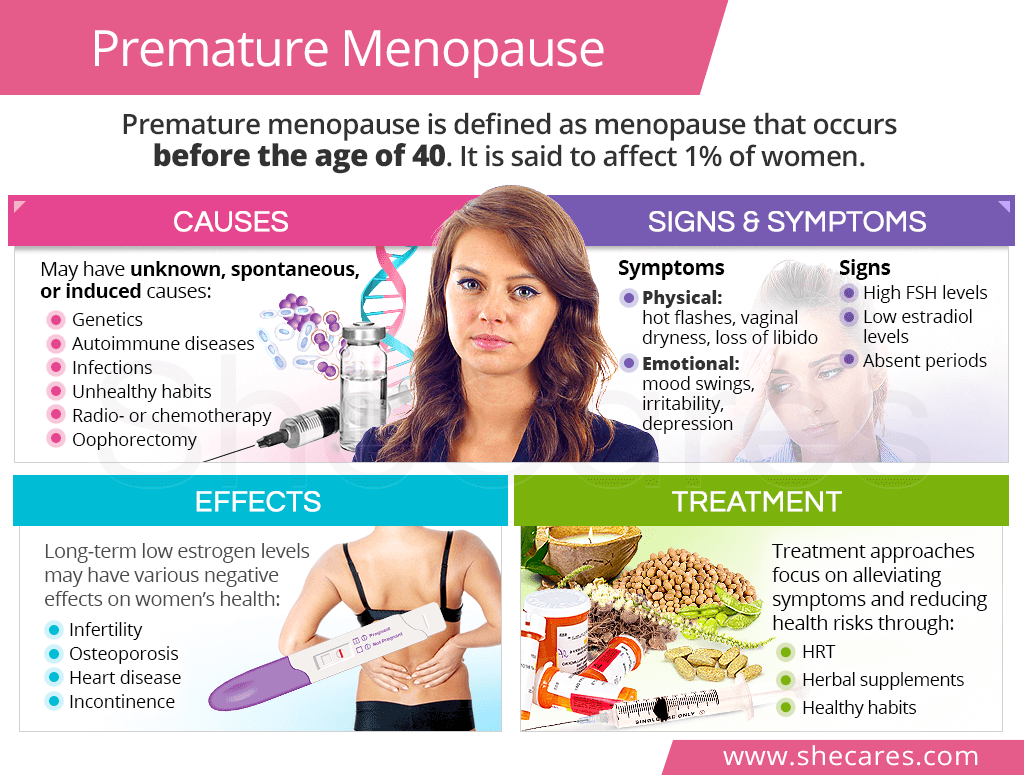What is Premature Menopause?
Premature menopause is defined as menopause that occurs before the age of 40.2 This means that women's periods stop and fertility ends before they reach 40 years old. This can include menstrual cessation during teen years, too.
Premature menopause differs from early menopause in that the latter occurs between the ages of 40 and 45.2 They share the majority of symptoms and causes. Keep in mind the typical age of menopause in the United States is 51.3
Premature Menopause Causes
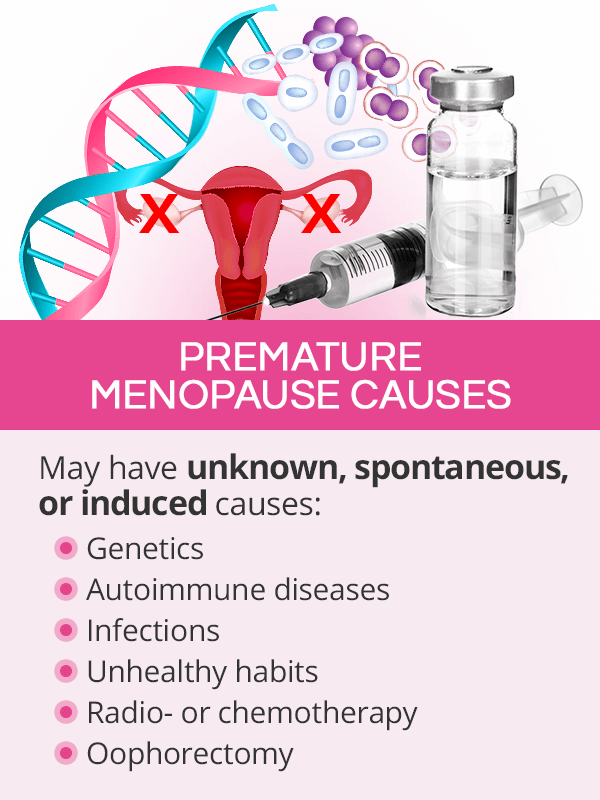
Premature menopause can have spontaneous, induced, or unknown causes. They may include the following:
- Genetics, including family history and chromosomal abnormalities
- Autoimmune diseases, such as thyroid diseases and Addison's disease
- Infections, like mumps or pelvic tuberculosis
- Unhealthy habits, like smoking and poor nutrition
- Radio- or chemotherapy side effects (may be reversible)
- Oophorectomy (surgical ovary removal)
Signs and Symptoms of Premature Menopause
Generally, every woman's menopausal experience is unique, which also applies to those passing through premature menopause. This pertains to the type of symptoms she faces as well as their severity and duration.
Symptoms of Premature Menopause
Premature menopause symptoms are the same as when it occurs at the typical age, including hot flashes, vaginal dryness, loss of libido, mood swings, weight gain and headaches.
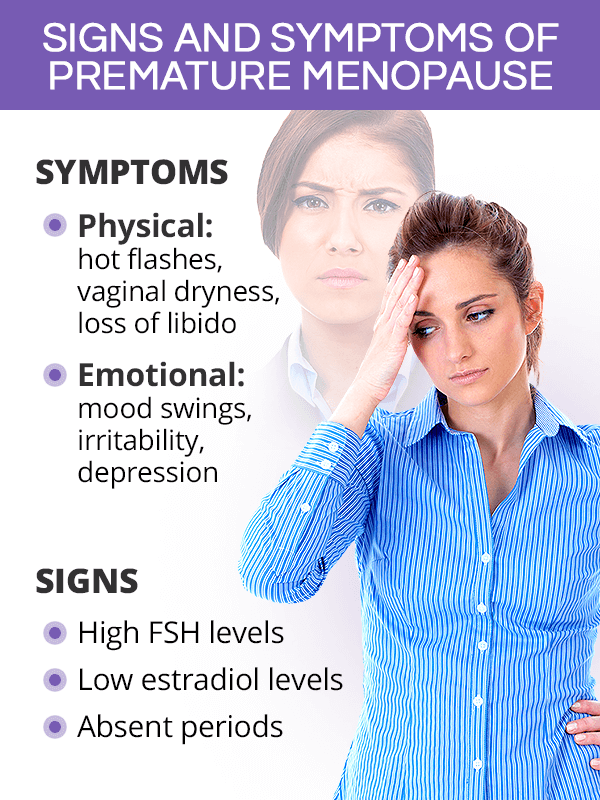
Those menopause symptoms are likely to start a few years before a woman's final period. However, it is not uncommon for them to persist into postmenopause.
Signs of Premature Menopause
A doctor will likely order several tests to determine potential causes of experienced symptoms. To complete the diagnosis, he or she will look for the following signs of premature menopause:
- High levels of follicle-stimulating hormone (FSH)
- Low levels of estradiol (a form of estrogen)
- Absence of menstrual periods (amenorrhea)
Premature Menopause Effects
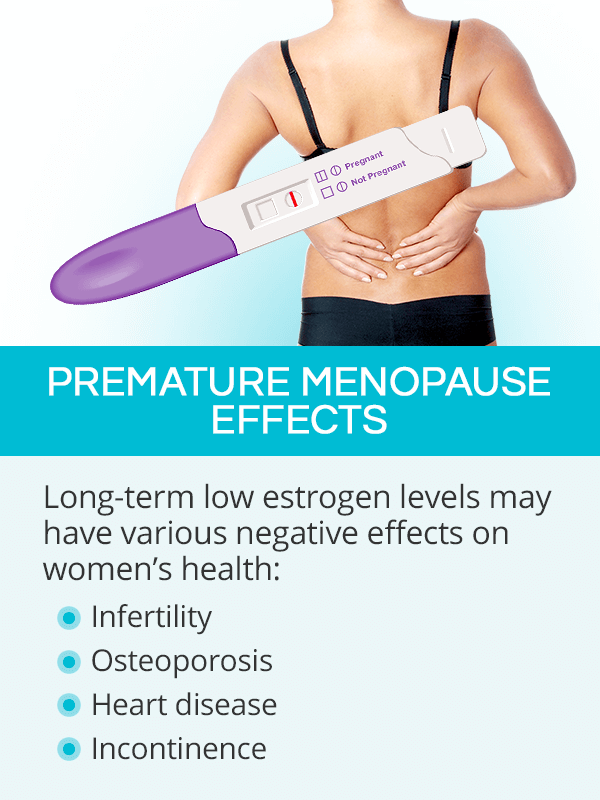
Entering menopause prematurely means that women will spend more years of their lives with low estrogen levels. Such consistently low hormone levels and a longer postmenopausal life put them at a higher risk of certain health problems.
Infertility
Premature menopause means that a woman's ovaries have wound down their functions (that is, no more monthly egg releases nor estrogen and progesterone production). Without these, achieving natural pregnancy is not possible, which can have devastating effects on women's psyche, particularly for those considering motherhood.
However, medical advances enable women who have gone through premature menopause to get pregnant. It can be achieved through in vitro fertilization (IVF) using egg donation, or her own eggs if she has undergone egg freezing before menopause.
Osteoporosis
With no estrogen being produced in the ovaries, osteoporosis - characterized by low bone density - can affect prematurely menopausal women. This comes with at an increased risk of fractures, which is a significant impairment keeping in mind that premature menopause can occur in young women, between teen years and the age of 40.
Cardiovascular Disease
Since estrogen has cardioprotective properties, its consistently low levels after premature menopause make women more prone to cardiovascular disease. This includes ischemic heart disease, angina, and others.
Other risks of premature menopause may include increased overall mortality, incontinence, neurological diseases, sexual dysfunction, and psychiatric disorders.
Premature Menopause Treatment
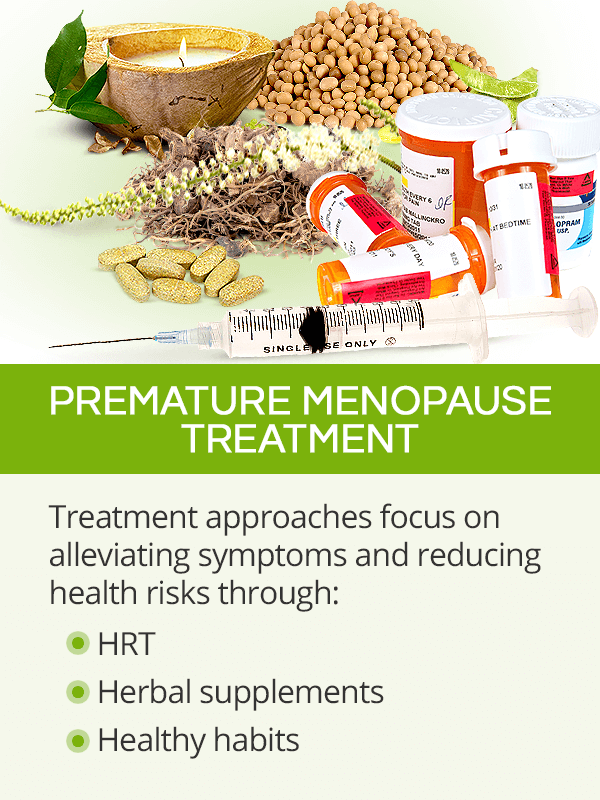
Unfortunately, there is no treatment that can stop or reverse premature menopause. Most treatment efforts are oriented towards relieving symptoms and reducing negative consequences on women's health.
Nevertheless, there's help available in the form of menopause medications or natural menopause treatments.
Hormone Replacement Therapy (HRT)
Because of serious health risks associated with premature menopause, women are generally recommended to take HRT short-term. The goal of HRT in this population is to relieve bothersome symptoms and reduce long-term risks.
Although the use of HRT itself has been associated with increased health risks, experts agree that they are outweighed by its benefits in women going through premature menopause. Nevertheless, HRT should be used with caution.
Herbal Supplements
Premature menopause women can also consider various herbal supplements aimed at naturally balancing hormone levels to ease discomforts.
There are two types of menopause supplements worth looking into: phytoestrogenic supplements, like black cohosh, that are best for short-term use and hormone-balancing supplements, like Macafem, which can be used long-term.
Lifestyle Habits
Implementing healthy lifestyle habits early on is an essential part of premature menopause treatment. They can be a tremendous help on their own as well as in conjunction with other prescribed regimens.
These wholesome practices can include loading up on foods rich in phytoestrogens, staying physically active on a regular basis, and learning to reduce stress through alternative therapies.
Key Takeaways
The term premature menopause is used when a woman stops having her periods before the age of 40, often as early as teen years. Affecting 1% of females, it can have negative consequences on their physical and emotional health, both short- and long-term. Because they no longer menstruate, women cannot get pregnant naturally, leaving them with IVF as the only path to motherhood. Living with low estrogen levels – which are characteristic of premature menopause – also puts women at a higher risk of osteoporosis and heart health, among other complications. Premature menopause treatments are focused on alleviating symptoms and reducing long-term risks through cautious use of HRT as well as herbal supplements and wholesome lifestyle habits.
Sources
- Annals of Medical & Health Sciences Research. (2013). Premature Menopause. Retrieved February 8, 2021 from https://www.ncbi.nlm.nih.gov/pmc/articles/PMC3634232/
- Medline Plus. (2016). Menopause. Retrieved February 8, 2021 from https://medlineplus.gov/menopause.html
- Medline Plus. (2019). Primary Ovarian Insufficiency. Retrieved February 8, 2021 from https://medlineplus.gov/primaryovarianinsufficiency.html
- National Cancer Institute. (n.d.). Premature Menopause. Retrieved February 8, 2021 from https://www.cancer.gov/publications/dictionaries/cancer-terms/def/premature-menopause
- Office on Women's Health. (2018). Early or premature menopause. Retrieved February 8, 2021 from https://www.womenshealth.gov/menopause/early-or-premature-menopause
- The North American Menopause Society. (n.d.). Perimenopause & Premature Menopause FAQs. Retrieved February 8, 2021 from https://www.menopause.org/for-women/expert-answers-to-frequently-asked-questions-about-menopause/perimenopause-premature-menopause-faqs
Footnotes:
- Better Health Channel. (2018). Premature and early menopause. Retrieved February 8, 2021 from https://www.betterhealth.vic.gov.au/health/conditionsandtreatments/premature-and-early-menopause
- Maturitas. (2011). Premature menopause or early menopause: long-term health consequences. Retrieved February 8, 2021 from https://www.ncbi.nlm.nih.gov/pmc/articles/PMC2815011/
- Cleveland Clinic. (2019). Premature and Early Menopause. Retrieved February 8, 2021 from https://my.clevelandclinic.org/health/diseases/21138-premature-and-early-menopause
